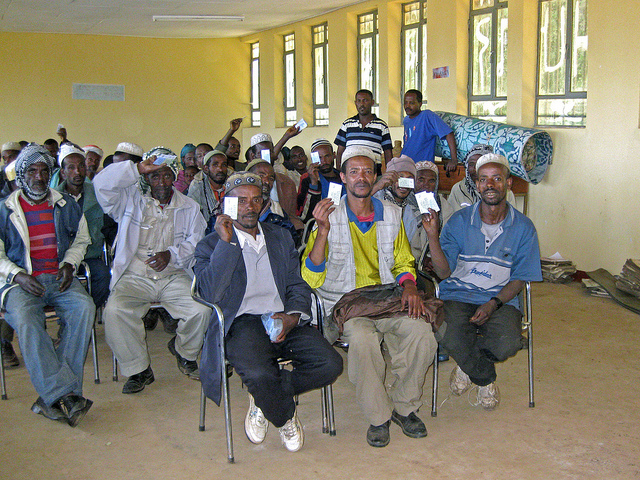This week, the Chicago Council on Global Affairs is hosting the Global Food Security Symposium in Washington, D.C. This year’s event explores business, social, and policy innovations in addressing food security. One of these key innovations is index insurance, which pays claims based not on confirmed losses, but on deviations from a statistical index of rainfall, temperature, and other conditions affecting farmers—thus not requiring claims adjustors. IFPRI has been helping design and evaluate index insurance products to aid farmers in mitigating the impact and managing the risks associated with severe weather and crop loss.
IFPRI’s assessments of index insurance in Bangladesh, Ethiopia, India, and Uruguay found high adoption rates of these simple and flexible products by smallholder farmers, helping enhance their resilience and productivity. Further, using the insurance has resulted in welfare improvements for farmers. This project is supported by the International Initiative for Impact Evaluation (3ie), Inter-American Development Bank (IDB), United Kingdom’s Department for International Development (DFID), and United States Agency for International Development (USAID).
In Ethiopia, IFPRI engaged private sector partners, Buusaa Gonofaa MFI and Oromia Insurance Company, to develop an insurance option that improved household welfare in villages where group risk-sharing had been encouraged. IFPRI’s evaluation found increased demand for the insurance, up to 40 percent in one district. In Bangladesh, an insurance product created in collaboration with BRAC, Gram Unnayan Karma, Meteorological Department, Bangladesh Bureau of Statistics, Ministry of Finance, and Data Analysis and Technical Assistance, was used by about 87 percent of farmers in the pilot program areas. IFPRI’s study in Bangladesh of the impact of different financial products showed that well-designed index insurance products are highly welfare enhancing for all farmers.
In Uruguay, IFPRI collaborated with the Ministry of Agriculture, IDB, Banco de Seguros del Estado, Instituto Nacional de Meteorología, Universidad ORT, and Grupo RADAR to design and pilot an insurance product providing coverage for select horticultural products in the southern region of Canelones. Initial findings from an evaluation, which will be published in 2017, demonstrated that farmers became better educated about how to protect their financial stability and were better able to cope with climate-related shocks. In addition, the insurance product enhanced the Ministry of Agriculture’s efficiency in handling agricultural losses. By knowing exactly what is owed to farmers during crop failures, the ministry avoids long and costly negotiations and bargaining to determine payouts. The success of the pilot encouraged the Government of Uruguay to expand coverage to citrus crops and grains in other regions.
IFPRI’s innovative work in index insurance continues to have positive results in all study countries, showing that investing in low-cost, simple and flexible insurance is highly beneficial to farmers’ welfare.
Janna de la Paz is an IFPRI Program Analyst. This post first appeared on IFPRI’s Outcome Stories blog; to view/download/print a PDF of that post, click here. For more outcome stories about how IFPRI research is influencing stakeholders and policy debates around the world, click here.







